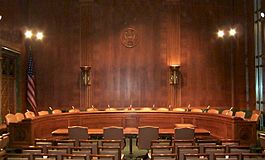U.S. Senate Judiciary Committee
| Standing committee | |
|---|---|
Active United States Senate 115th Congress |
|
| History | |
| Formed | December 10, 1816 |
| Leadership | |
| Chair |
Chuck Grassley (R) Since January 3, 2015 |
| Ranking member |
Dianne Feinstein (D) Since January 3, 2017 |
| Structure | |
| Seats | 21 members |
| Political parties |
Majority (11)
|
| Jurisdiction | |
| Policy areas | Federal judiciary, civil procedure, criminal procedure, civil liberties, copyrights, patents, trademarks, naturalization, constitutional amendments, congressional apportionment, state and territorial boundary lines |
| Oversight authority | Department of Justice, Department of Homeland Security, federal judicial nominations |
| House counterpart | House Committee on the Judiciary |
| Meeting place | |
| 226 Dirksen Senate Office Building, Washington, D.C. | |
 |
|
| Website | |
| judiciary |
|
| Rules | |
The United States Senate Committee on the Judiciary, informally the Senate Judiciary Committee, is a standing committee of 21 U.S. Senators whose role is to oversee the Department of Justice (DOJ), consider executive nominations, and review pending legislation.
The Judiciary Committee's oversight of the DOJ includes all of the agencies under the DOJ's jurisdiction, such as the FBI. It also has oversight of the Department of Homeland Security (DHS). The Committee considers presidential nominations for positions in the DOJ, the Office of National Drug Control Policy, the State Justice Institute, and certain positions in the Department of Commerce and DHS. It is also in charge of holding hearings and investigating judicial nominations to the Supreme Court, the U.S. court of appeals, the U.S. district courts, and the Court of International Trade. The Standing Rules of the Senate confer jurisdiction to the Senate Judiciary Committee in certain areas, such as considering proposed constitutional amendments and legislation related to federal criminal law, human rights law, immigration, intellectual property, antitrust law, and internet privacy.
...
Wikipedia
